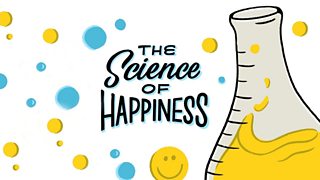Why sweeping leaves can make us feel happier
Summer is here, which for many of us means more time spent in the great outdoors. This is good news for our minds, because plugging into the natural world can help ease our nerves and reduce our tendency to ruminate.
In the podcast The Science of Happiness, Dacher Keltner is joined by Shoukei Matsumoto, a Buddhist monk and author of A Monk's Guide to a Clean House, to find out how simple acts such as sweeping leaves can have a deep impact on our minds and bodies.
Cleaning outside can help you let go of perfectionism.
Whether it’s raking leaves in the garden or picking up rubbish in a park, cleaning outside can be a mindful practice, says Matsumoto, who has been a Buddhist monk for more than 20 years.
“I think cleaning is a good way to leave our goal-oriented mindset or mindset for efficiency. To just enjoy it, without thinking of how you can do it better.”
Matsumoto sweeps leaves outside his Buddhist temple outside Kyoto, Japan as part of his meditative practice.
“You may think cleaning is about perfectionism. But it's not. I'd say it's a practice to help us to leave perfectionism. We cannot complete cleaning. Right after cleaning, the leaves start falling again.”
Repetitive chores like sweeping can help you to become more mindful.
The practice of cleaning is “meditation in motion”, as Matsumoto calls it, which involves concentrating on your physical motion.
“Sometimes your mind might be occupied with issues you're facing or emotions of anger. If you are occupied with some emotion or thought, try to concentrate on your motion in cleaning so that it reduces your attachment to the issue or problem you are facing.”
Gardening is a chance to connect with nature.
Cleaning outdoors is Matsumoto’s favourite chore, he says, because it’s an opportunity to commune with nature. “When you clean outdoors, you examine nature. But not only that, you become nature. Nature is not something outside of yourself.

“We can feel the wind, we can see the change of the season and touch the soil and the microbes in the soil – and so we are beyond ourselves.”
This sense of interconnectedness can change the way you think about your own identity, he says. “In this [culture of] consumerism, we tend to be obsessed with being very valuable in our existence as a producer or as a consumer. But we can be neither; we can be a ‘decomposer’! So that's the great learning in this cleaning practice.”
‘Mindfulness is a skill.’
Matt Heron, a Canadian who has lived in Kyoto for the last five years, took time from his busy work schedule to visit Matsumoto at his temple and sweep leaves with him.
Heron found the sweeping to be sometimes frustrating. “It's an interesting ebb and flow,” he says. “The start is very smooth and nice and relaxing. As we get into the middle, all the leaves start falling into the cracks of the stones. Then I have to start sweeping a little more aggressively. And then I can go back to the relaxing part. If I was better with the broom, I assume [I would be] a little less aggravated.
“What I was taking away from it is that the whole idea of mindfulness and interbeing is more like a skill than it is simply something you can turn on and turn off.”
-
![]()
Sliced Bread
Greg Foot investigates the so-called wonder products making bold claims.
-
![]()
The Curious History of Your Βι¶ΉΤΌΕΔ
Discover the extraordinary history of ordinary items all around you.
-
![]()
Young Again
Kirsty Young takes her guests back to meet their younger selves and asks the question: if you knew then, what you know now... what would you tell yourself?
-
![]()
Cautionary Tales with Tim Harford
We tell kids unsettling fairy tales to teach them life lessons, but Cautionary Tales are for grown ups.





